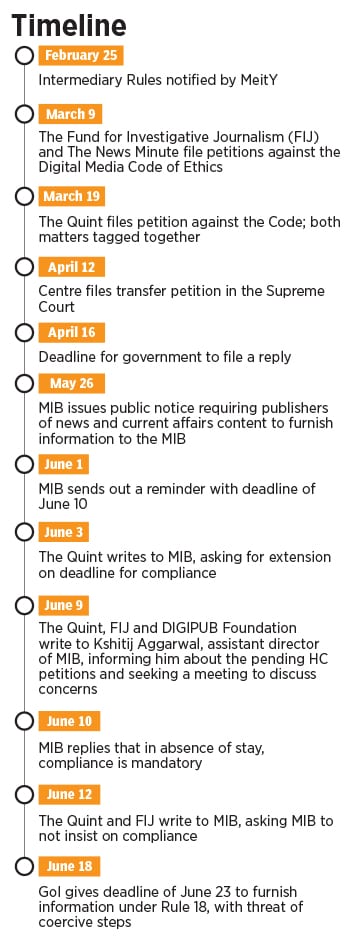
'Don't seek compliance until Delhi HC decides on Code of Ethics validity': Online news publishers to MIB
As their main petitions are pending before the Delhi HC, The Wire and The Quint want the court to restrain government from taking coercive action against them for not furnishing information. Alt News has also joined the fray against the Code
 The Quint, The Wire and Alt News approach Delhi High Court to stop the government from taking coercive action against them for not furnishing information under the much-contested Digital Media Code of Ethics. Image: Shutterstock
The Quint, The Wire and Alt News approach Delhi High Court to stop the government from taking coercive action against them for not furnishing information under the much-contested Digital Media Code of Ethics. Image: Shutterstock
Online news platforms The Wire and The Quint, and fact-checking website Alt News, do not want coercive steps to be taken against them for not complying with the new Digital Media Code of Ethics while their petitions challenging the Code are decided upon in the Delhi High Court.
In an application filed before the Delhi High Court on June 21, the Foundation for Independent Journalism (FIJ, publisher of The Wire) and The Quint argued that a June 18 notice from the Ministry of Information and Broadcasting (MIB) to furnish information by June 23 under Rule 18 is a “palpably coercive step” and have sought a stay on the MIB’s notice. It is understood that Alt News has made a similar petition as the latest entrant in the litany of litigation against the new Code of Ethics.
The Quint and FIJ have argued against the very basis of regulatory regime: a regulatory regime over media headed by the executive is undemocratic. The publishers “cannot be subjected to a regulatory regime where digital news publications … are in the control and supervision of the government … an idea that has no place in any modern democracy”, says the petition. They have also said that most of these details are already in the public domain.
In his June 18 letter to The Quint and FIJ, Kshitij Aggarwal, the assistant director of digital media at MIB, wrote that not furnishing the information will be treated as “wilful non-compliance of the statute”. If information is not furnished by June 23, he wrote that MIB will take “appropriate action for non-compliance”. In response to The Quint and FIJ’s June 9 letters citing pending high court cases against the Code, Aggarwal wrote, “ongoing cases do not entail non-compliance to the rules” and that publishers are “mandated to furnish information” under Rule 18.
The Quint and FIJ have also argued that if a stay is not granted and the MIB is not restrained from taking further coercive steps, the publishers could be penalised under Section 44 of the Information Technology Act, 2000, as per which the publishers may be fined up to ₹5,000 per day for not furnishing information.









